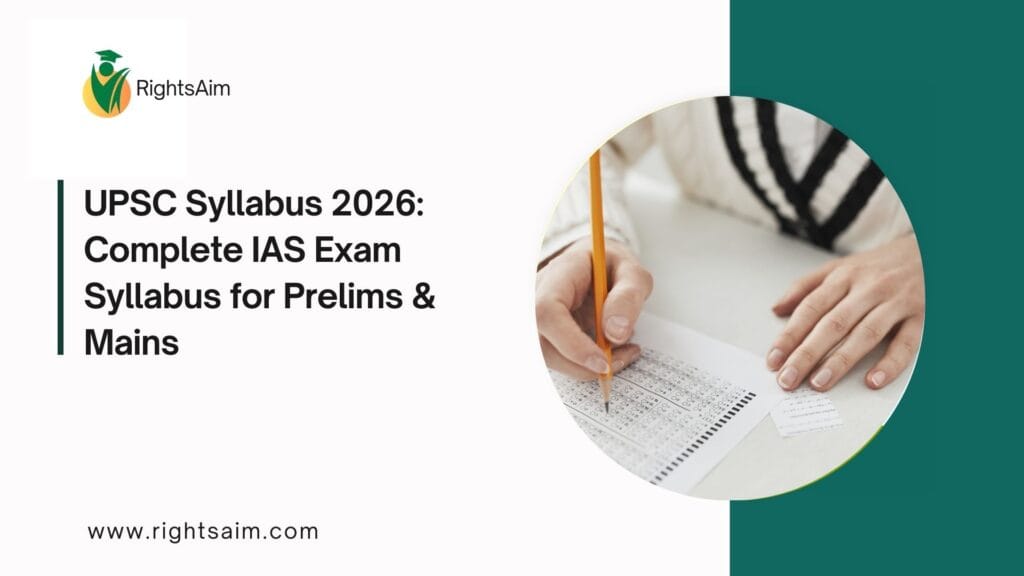
📌 Overview of UPSC CSE 2026
Conducting Body: Union Public Service Commission (UPSC)
Exam Name: Civil Services Examination (CSE)
Posts: IAS, IPS, IFS, IRS, and other Group A & B services
Stages: Prelims, Mains, and Interview
Mode: Offline (Pen & Paper)
Syllabus: Prelims (Objective), Mains (Descriptive), Interview (Personality Test)
📝 UPSC Prelims Syllabus 2026
The UPSC Prelims is the screening stage, consisting of two objective-type papers. Marks from Prelims are not countedin the final merit but are crucial to qualify for Mains.
Paper I: General Studies (200 Marks)
Topics include:
Current Affairs: Events of national and international importance
History of India & Indian National Movement
Indian and World Geography: Physical, Social, Economic Geography of India and the World
Indian Polity & Governance: Constitution, Political System, Panchayati Raj, Public Policy, Rights Issues
Economic & Social Development: Poverty, Inclusion, Demographics, Sustainable Development
Environment & Ecology: Biodiversity, Climate Change, General Issues
General Science
Paper II: CSAT (Civil Services Aptitude Test) (200 Marks, Qualifying)
Comprehension
Logical Reasoning & Analytical Ability
Decision Making & Problem Solving
Basic Numeracy & Data Interpretation (Class 10th level)
Interpersonal Skills including Communication Skills
✅ Note: CSAT is qualifying in nature; candidates need to score 33% marks.
📖 UPSC Mains Syllabus 2026
The Mains Examination tests a candidate’s in-depth knowledge, analytical ability, and writing skills. It consists of 9 descriptive papers, out of which 7 are counted for merit.
Qualifying Papers:
Paper A – Indian Language (300 marks)
Paper B – English (300 marks)
(Candidates must score at least 25% in each paper to qualify. These marks are not added to merit.)
Papers Counted for Merit:
Essay Paper (250 Marks)
Write two essays on given topics, testing coherence, originality, and depth.
General Studies Paper I (250 Marks)
Indian Heritage & Culture
History and Geography of the World & Society
General Studies Paper II (250 Marks)
Governance, Constitution, Polity, Social Justice & International Relations
General Studies Paper III (250 Marks)
Technology, Economic Development, Biodiversity, Environment, Security & Disaster Management
General Studies Paper IV (250 Marks)
Ethics, Integrity & Aptitude – case studies and ethical dilemmas
Optional Paper I (250 Marks)
Optional Paper II (250 Marks)
Candidates choose one subject from the list of 48 optional subjects (e.g., Public Administration, Geography, Sociology, History, Literature, etc.).
📊 Total Marks in Mains: 1750
👤 UPSC Interview (Personality Test)
Candidates who clear Mains are called for the Interview round (275 Marks). It assesses:
Intellectual qualities
Decision-making ability
Leadership skills
Awareness of current issues
Integrity and suitability for public service
📊 Final Merit Calculation = Mains (1750) + Interview (275) = 2025 Marks
📥 Download UPSC Syllabus 2026 PDF
The UPSC releases the official syllabus in its CSE notification. Candidates can download the detailed syllabus from the official website: upsc.gov.in.
For quick reference, aspirants can also download a compiled UPSC Syllabus 2026 PDF that includes both Prelims and Mains topics. Keeping a PDF copy helps in structured preparation and regular revision.
📌 Preparation Tips for UPSC 2026
Start with NCERTs for basics in History, Geography, Economics, and Polity.
Follow standard books like Laxmikant for Polity, Spectrum for Modern History, and Ramesh Singh for Economics.
Read newspapers daily for current affairs (The Hindu, Indian Express).
Revise regularly and practice answer writing for Mains.
Take mock tests for both Prelims and Mains to improve accuracy and time management.
🔑 Conclusion
The UPSC Syllabus 2026 for IAS, IPS, IFS, and other services is vast and multidimensional, covering everything from history to ethics. Success in the Civil Services Exam requires not just hard work but also smart strategy, consistent revision, and clear conceptual understanding.
By breaking the syllabus into manageable sections, preparing with the right resources, and practicing regularly, aspirants can significantly boost their chances of clearing one of the toughest exams in India.
👉 Download the official UPSC Syllabus 2026 PDF from upsc.gov.in and begin your journey towards becoming a Civil Servant today.


